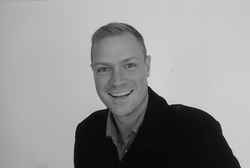Dean WD Rimmer
B. Soc.Sci. Psychology (UCT)
Hons. Clinical Psychology - (UNISA)

My interest in the mind began in high school, and for the last eight or so years has lead me on some very interesting roads. While studying a B.Social Sciences at the University of Cape Town, I majored in Psychology. At the same time, I kept my passion for less conventional conceptualizations of the mind stimulated by intense self-study, sometimes to the detriment of my recognized academics! Having been brought up thinking very little of the limitations of the mind, I was always convinced that there were answers to be found, regardless of the nature of the problem. Being introspective by nature, I found that the problems that dominated my thinking were predominantly internal - being in my late teens, I found that there was no shortage of inner conundrums to work on.
While I found many answers to my questions in my studies at university, it was there that I realized that while the debate around the duality of the brain and mind raged on, I needed to find practical, real-world based solutions that neither side could, at that time, provide. It was then that I began to gain real interest in the holistically-minded teachings of the East. Where Western science was attempting to understand the mind through ever-closer inspection of its physical components, relying on the very latest technologies, here were thousand-year-old theories that had barely changed through the years claiming to hold the secrets to inner peace, tranquility and mental effectiveness. I immediately noted that I was in a great position to compare and analyze all the differing approaches, and ultimately draw on the most effective ideas in each so that I could move myself further beyond even the lofty limits I had imagined for myself. I began to recognize the ways in which all these different techniques could be of practical use and familiarize myself with the theories that had already begun to combine the knowledge of both the East and the West.
The decision to create a formal programme through which I could impart the things I have learned has come as a result of the fact that I now feel comfortable enough with these techniques and philosophies to help others learn their ins-and-outs.
While I found many answers to my questions in my studies at university, it was there that I realized that while the debate around the duality of the brain and mind raged on, I needed to find practical, real-world based solutions that neither side could, at that time, provide. It was then that I began to gain real interest in the holistically-minded teachings of the East. Where Western science was attempting to understand the mind through ever-closer inspection of its physical components, relying on the very latest technologies, here were thousand-year-old theories that had barely changed through the years claiming to hold the secrets to inner peace, tranquility and mental effectiveness. I immediately noted that I was in a great position to compare and analyze all the differing approaches, and ultimately draw on the most effective ideas in each so that I could move myself further beyond even the lofty limits I had imagined for myself. I began to recognize the ways in which all these different techniques could be of practical use and familiarize myself with the theories that had already begun to combine the knowledge of both the East and the West.
The decision to create a formal programme through which I could impart the things I have learned has come as a result of the fact that I now feel comfortable enough with these techniques and philosophies to help others learn their ins-and-outs.
